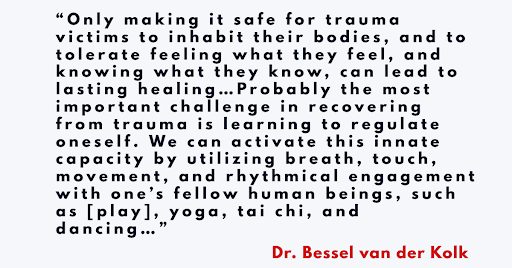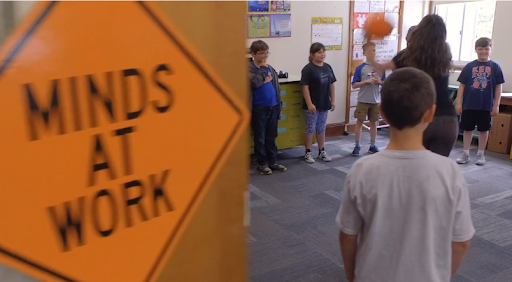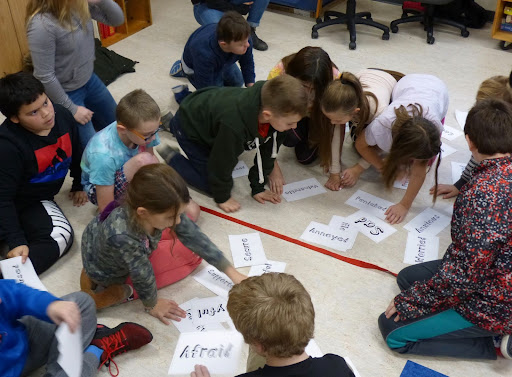Letting Go Of Stress Through Play
By Jim Grout
Does anyone else feel mentally and emotionally challenged and exhausted? Survey after survey (see First Book Report below), as well as conversations with teachers and students, repeatedly remind us of the frayed and fragile state of student mental health in and out of school. Through our youth leadership-training work in schools, our Edge of Leadership team has seen firsthand the impact of diminished social bonds with peers and teachers and heightened stress levels in the classroom. There’s nothing anecdotal about the lack of mental wellbeing; students and teachers are struggling and we want to help change that.
Mind-Body Connection
Despite disturbing mental health reports, we notice glimmers of hope and resilience starting to percolate in classrooms. We’re uncovering pathways to support students that combine social-emotional learning concepts with activities and games to inspire wellbeing and connection. Push Catch is one of several activities we use at High 5 Adventure Learning Center to help surface challenging emotions and reactions. By using a physical experience as the catalyst, these emotions are made available to be examined and reflected upon. In the post-game discussion, students exhibit keen self-awareness about what they felt at different points in the game: surprise, frustration, anxiety, and even anger.
The connection between our bodies and our emotions, including the unique grounding benefits of physical movement as a pathway for working through challenging emotions, is well documented. In his bestselling book, The Body Keeps the Score, Dr. Bessel van der Kolk describes how our bodies become repositories for traumatic experiences, at their most severe even impacting the immune system and organ functioning. He describes how trauma survivors can utilize physicality as a route to emotional healing:

How To Play Push Catch

The High 5 facilitator gathers the students in a circle and stands in the middle holding a ball. The leader explains the rules: “One by one, I’m going to throw this ball to you. As I toss you the ball, I’m going to say either ‘Push’ or ‘Catch.’ Your goal is to do the opposite of what I say.
If I say ‘Push,’ you need to catch the ball. If I say ‘Catch,’ you need to push the ball back to me. If you make a mistake, you are out and can sit in your spot. The last person standing will be the winner. Ready? Let’s go!”
Seconds later, with the ball zooming toward them, each student must instantaneously override what they have heard and activate their muscle memory to perform the opposite action. The stakes are high – no one wants to be out! The results are both funny and frustrating as the group realizes just how hard it is to trick our brains, even for the simplest of actions.

Healthy Tips for Practicing Emotional Regulation
As mental health issues among young people surge, incorporating physical movement into our work with students provides a grounding technique to help them stay present with the emotions of trauma or stress. Even a small physical activity, like stretching, can create the needed space to allow them to recognize, reflect, and regulate their emotions – especially traumatic feelings like grief, anger and feeling overwhelmed – which have become particularly acute during the pandemic. Physical movement helps to anchor what arises.
Research and our experience show that rebuilding from traumatic experiences requires that we strengthen our skills to identify and manage our emotions, especially in situations where we feel anxious. High 5 facilitators model this self-regulation skill as part of the Push Catch game instructions and debriefing. For example, students are told they can take themselves out of the game at any point during the activity if they no longer wish to play. This models for the students how to activate choice and control, as well as provide a way to manage their own emotions if the pressure becomes too intense.
Following any physical activity, we help students reflect on how they can regulate the emotions that arise. Examples of questions we use in facilitation include:
- How might the emotions we experienced in the game show up in the ways we act and react in other situations?
- What are some strategies you could use to manage these emotions that would be appropriate in these situations?
Often the most valuable question to use is one that reveals to students how common their experiences are. We ask, “By a show of hands, who else felt that way?” Inevitably, almost all the hands go up. Through challenge and reflection comes insight. Experiential learning is an effective means to increase understanding of the self and others. And it’s fun.
Additional Resources
First Book Survey Report: The Impact of COVID-19 on Student Mental Health in Communities of Need
Vertical Playpen Podcast Episode: Neurochemicals at Play – How Play Impacts Learning
Discover more activities to try in class. High 5 Small Program Bag
Download the activity Push Catch and try it with your student